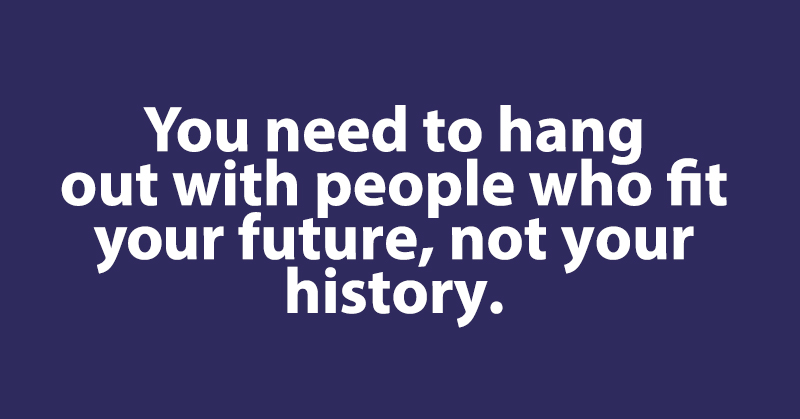Many people have friends they’ve known for what feels like forever. Maybe they met in college or at work or in a carpool group, or they go way back from childhood. With these types of friends, the friendship feels secure, as do most relationships that have lasted for years, but people may take these connections as facts of life without reflecting further on them.
Whenever two people meet for the first time, they scrutinize each other, deciding whether they want their acquaintance-ship to progress to something more. Do they complain a lot? Do they come off as pompous or pessimistic? Is their company enjoyable or draining? Yet when it comes to already established friendships, people give up on deep analysis. Is it what it is, right?
Unfortunately, maintaining the status quo — in this case, keeping a friendship that drags you down because you’ve known them for a while — can be detrimental to a person’s wellbeing and development. This applies to family members as well.
People change as the years go by, which calls for the occasional re-evaluation to ensure the friendships are healthy and productive for both parties. Life is too short to waste it on people who are draining, negative, and bad influences. [1]
The 5 types of friends you don’t need in your life
Here are five types of friends you may have that are dragging you down:
1. The Complainer

This friend seems to be filled with negative energy. No matter what happens, they always notice the bad side of every situation. When something goes wrong, they make sure everyone knows about it — several times. It’s difficult to keep a positive outlook around these kinds of people, and their vibes tend to drain you. They like their complaints to be heard but they don’t care for solutions.
It’s almost impossible to have fun with chronic complainers because they are so hard to please, which places a large weight on your shoulders — a weight you shouldn’t have to bear. You are not responsible for anyone else’s happiness. Especially for a person who believes the world is out to get them. [2]
2. The Naysayer

You hate mentioning new ideas, plans, and goals with this friend because they’ll counter them with a list of why they’ll never work and why you were dumb to think of such things in the first place. You tend to feel unheard and belittled around these people. Their criticism is not productive or helpful; it’s cynical and hurtful. There’s nothing like being excited for something only to have someone take the wind right out of your sails.
The naysayers are afraid of leaving their comfort zone in case they fail. They project this fear onto others. If they would probably fail, how could someone else hope to succeed? [3]
3. The Doubter

The doubter isn’t as “in your face” as the naysayer but their tactics can be much worse. See, they won’t shoot down your ideas and goals; in fact, they’ll seem supportive of you. However, as soon as something goes amiss, they will be there to nitpick every one of your failures and claim they knew it wouldn’t work.
They doubt your abilities because they doubt their own and while they cheer you, they secretly want you to fail. They are concerned with their own inadequacies and don’t want you to leave them in the dust. [4]
4. The Bragger

Braggers are easy to spot. Every time something goes right for them, they make sure everyone knows it — multiple times. They seek constant validation because they are insecure and lack self-esteem. Their confidence relies on others’ admiration and attention. That is why when you have some exciting news to share, they must steal the spotlight and one-up you, instead of being happy for you.
They might also “humble brag,” which is possibly more infuriating. They complain or self-deprecate in order for people to say, “No, you’re actually awesome!” This behavior stems from their insecurities, and it’s unhealthy for you to be the core of a person’s self-esteem. [5]
5.The Flaker

Truly one of the more annoying types of friends! Everyone bails on plans from time to time; life happens. The flaker is the friend who is notoriously unreliable because of their skewed priorities. They’ll forget important dates, even after several reminders, and come up with a bad excuse or no excuse at all. They have other bad habits such as interrupting others, taking phone calls in the middle of conversations, and scrolling through social media constantly. It’s easy to feel disconnected from flaky friends since they seem to care so little about you, even when they claim they care a lot.
Some people are flaky because they have poor time-management skills or overestimate their abilities. These people tend to face these flaws and make strides to improve. After all, all humans are flawed in some way. However, some people flake or turn up late as a manipulative and passive-aggressive tactic. They may gaslight you if you try to confront them on their behavior. These are the types of flakers you don’t need in your life. [6]
True Friendship
Friends are family members that you choose. They should inspire you, encourage you, and leave you feeling happy and content with yourself. Although it’s difficult to let go of harmful friends, their absence will leave room for you to become a better version of yourself and allow happier, healthier people to enter your life.
Sources
- “A psychologist identifies 7 signs it’s time to let go of a friendship.” Business Insider. Ellen Hendriksen. April 3, 2017.
- “How to Deal with Chronic Complainers.” Life Hacker. Patrick Allan. August 10, 2019.
- “The Toxic Naysayer: Has One Infected Your Team?” Psychology Today. Sherrie Bourg Carter Psy.D. May 16, 2014.
- “Are You a Doubter?” Psychology Today. Beth Fisher-Yoshida Ph.D., CCS. April 2, 2015.
- “Why People Hate Humblebragging.” Psychology Today. Susan Krauss Whitbourne Ph.D. March 31, 2018.
- “Why do people flake out?” CNN. Serusha Govender. March 11, 2014.

